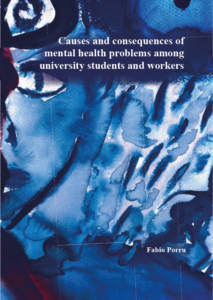PhD Defence Fabio Porru
The main aims of this thesis are to study i) the association between psychosocial factors and mental health among university students, and ii) the influence of mental health on work participation.
In the first part of the thesis, potential determinants of students’ mental health were investigated. Chapter 2 and chapter 4 investigate the associations between the dimensions of the effort-reward imbalance (ERI) model and, respectively, psychological distress and burnout symptoms among Italian university students. These studies were among the first using the ERI model in the university setting as determinant of mental health outcomes among university students. Chapter 2 presents a cross-sectional study among 4760 students. In the sample, more than one out of three students experienced severe psychological distress. Moreover, effort, reward, ERI, and overcommitment were found to be associated with psychological distress, in particular with severe psychological distress. Moreover, ERI and overcommitment partially explained the higher prevalence of psychological distress among female students, suggesting that part of the gender difference in psychological distress may be explained by psychosocial factors. Chapter 3 provides additional evidence about potential targets for interventions by showing that student life challenges, in particular high workload, faculty shortcomings and unsupportive climate, were associated with students’ mental and self-rated health. Notably, the between-within model utilized in chapter 3 and chapter 4 allows to investigate both differences between individuals and changes within individuals over time. Results indicate that, while most of the variance in exposure is attributable to difference between individuals, this exposure may change to some extent within individuals even within a relative short timeframe. This suggests that tackling the exposure in student life challenges, ERI and overcommitment may result in better mental health among students. Additionally, chapter 5 studied in across-sectional study among 1858 Italian medical students the psychometric properties of the Italian version of the University Stress Scale (USS) as a tool to measure sources of academic stress. Results suggests that the use of a short version of the scale (USS-S) is preferable to assess the level of students’ stress compared to the 19 item version.
In the second part of the thesis the consequences of mental health problems on work participation were studied. Chapter 6 and chapter 7 illustrate different mechanisms of the negative impact of mental health problems on work participation. Using register information of 2,346,393 young adults who graduated from secondary vocational and higher vocational education or university, chapter 6 contributes to the literature suggesting that mental disorders during later stages of higher education may negatively impact work participation via two mechanisms. On the one hand, students who experience a mental health problem in the year before completing higher education were less likely to enter paid employment during 10 years of follow-up. On the other hand, graduates who entered paid employment were more likely to exit from paid employment during the follow-up period. Meanwhile, differences across type of disorders in the association between mental disorders and work participation were identified. Chapter 7 investigated in a longitudinal study the association between depressive symptoms among 5,263 older European workers and early exit from paid employment during four years follow-up differentiating exit due to unemployment and disability. The study showed that depressive symptoms were associated with higher risk of early exit from paid employment via disability benefits among men and women and, to a much lesser extent, also unemployment among men.
Chapter 8 provides insights about the available literature concerning mental health among students in higher education, with recommendations for future research. Refining methodologies in prevalence estimation of mental problems and a comprehensive investigation of individual and environmental determinants are crucial. Given its more advanced state, research on mental health in the workforce may inform student-focused research.
In the general discussion, methodological implications of the studies included in this thesis are discussed, together with an overall frame of observational studies in mental health. In particular, the definitions of mental health and mental disorders together with strategies to assess them are discoursed. The complexity behind the concept of mental health and mental disorders requires further reflections over their definition, and transdisciplinary efforts to investigate their multifaceted concepts. Recommendations for policy and practice, and students are also discussed. In particular, the development of interventions aiming at primary prevention for mental health problems is recommended, together with efforts toward a more inclusive labor market / academic environment. A safe psychosocial academic environment is needed. Students are invited to invest resources in protecting their own mental health and passion, as a personal and professional investment.
Lastly, opportunities offered by social media to researchers are discussed. Social media may enable researchers to bidirectionally connect with the public, offering the opportunity to improve the quality and the communication of one’s research. Visibility on social media may also lead to scientific cooperation, invitations to academic events and teaching opportunities. Overall, social media can help public health researchers to make their work more meaningful, and can remind them why they do it.
